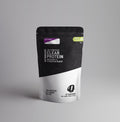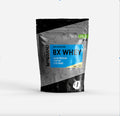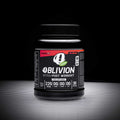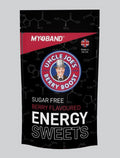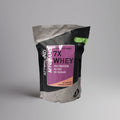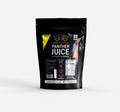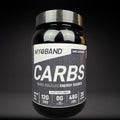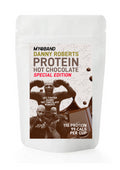The Wonder Of "Carb Absorption Blockers" For Weight Loss
Posted by PROPROTEIN LTD ADMIN

For centuries we have been consuming carbohydrates (carbs) and to this day they still hold a dear place in our hearts and on our plates; and rightly so as they are in almost everything we consume in our diets, they taste great and they are a preferred energy source for the human body. However, in recent times we have discovered and are still uncovering the hard-hitting truth that our daily bread can become a daily problem on our waistlines. So, what could be a solution?
Yes, you guessed it… ‘Carb Absorption Blockers’! Sounds too good to be true, right?
Well, let us take you through all you need to know about these natural supplements that could be an additional weight-loss tool, which still allows you to enjoy your favourite carb dishes without gaining the extra pounds.
What are they?
Carb Absorption Blockers are also known as ‘Carb-blockers’ or ‘Starch-Blockers’. In simple terms they do what they say on the tin, they help to “block” the breakdown of carbohydrates within the gut, which ultimately reduces the resulting absorption of a 4 calorie per gram sugar molecule into the bloodstream. The two main types of these natural supplements to be investigated and available today are:
- White kidney bean/Cannellini bean (Phaseolus vulgaris) extract
- Alpha-glucosidase inhibitors (AGIs)
These both act upon enzymes (chemical protein structures) that are responsible for carbohydrate digestion. However, the white kidney bean extract specifically inhibits the amylase enzyme found in your saliva where it begins to break down the large carb structures (starch) into smaller ones (maltose) and within the small intestine, amylase released from the pancreas continues this carb breakdown process until the sugar molecules are small enough to enter the bloodstream (1) (2). The compound from the white kidney bean extract is more widely available as a supplement that can be purchased from most healthcare stores than AGIs and has had greater research focused on the role it plays in weight loss. (1)
AGIs on the other hand, have been a contender for treating high blood sugar levels as they can be part of the medication regimen prescribed to type 2 diabetics as they have a similar function to the white kidney bean extract but target the glucosidase enzyme instead. Although the pure form of AGIs cannot be purchased mainstream, the Salacia Oblonga leaf plant, native to India contains natural compounds within the roots which promising studies show that they too have similar blood sugar controlling effects as the prescribed AGIs but these Salacia supplements may have a higher price tag and less accessible to purchase compared to white kidney bean extract supplements (3). Therefore, it is probably more ideal to start supplementing with the white kidney bean extract for weight management purposes.
In short, both these carb blockers have similar functions but they work on different carbohydrate specific enzymes. It is important to note that these supplements duty role is on blocking the carb absorption from large complex carbs (i.e potatoes) not necessarily sugars that are derived from processed foods and drinks (cakes, biscuits, even fruit juices!) that already contain high levels of simple sugars (the smallest forms of sugars - i.e. glucose).
So you may be wondering how these supplements can be used as a tool in weight loss and aid your health? Well, let's discuss further how this happens and their effectiveness.
How can they help with my weight loss journey and overall health?

To understand the full potential impact of carb blockers, we must first understand the complex digestive process of these carbs that has a part responsibility in you gaining weight. Seeing that our body's preferred energy source is glucose (sugar molecules) it is easier on our digestive system to break down due to the multiple mechanisms required for carb digestion, that include chewing, stomach acid exposure and the enzymes breaking down the complex carbohydrate chains into smaller sugars. Although this process is necessary and healthy, the tantalising sugar experience we are exposed to from the mouth instantly alerts our ‘reward centre’ in our brain communicating to us that this meal will be satiating (fulfilling) which encourages us to go back for more of these carb-rich items more frequently and perhaps in larger quantities, solidifying that comforting learned experience in our memory every time we eat. (4)
You would think that all glucose would be utilised by our bodies if it is our quick fuel source, but overconsumption of glucose means little is instantly metabolised and more is stored as glycogen (the main storage form of glucose) to act as a future energy source. This is all well and good but the glucose can also be converted to fat within your body which is your secondary long term-energy store and the well-known culprit for unhealthy weight gain. If you want to burn off that unwanted fat and ward it off from piling up again you have to allow your body to breakdown and utilise fat stores on a more regular basis instead of glucose. This is usually achieved through very low-to no-carb diets which have been shown to be very effective for short-term weight loss as they induce ketosis, a fancy term for a metabolic state when your body burns fat instead of glucose (5). However, these diets can be difficult to sustain in the long run for various reasons (e.g. affordability, unpleasant side effects, medical conditions that arise during the diet plan etc.). This is why they are not always considered lifelong staple diets, which is where these carb-blockers come in and could be that helping hand for your weight loss journey/management. (6)
As noted previously the main bulk of research on these carb-blockers was focused on white kidney bean extract and their response to weight loss which have reported to cause modest weight loss that many interestingly show participants who ate the most carbohydrates alongside supplementing with these blockers losing a significant amount of weight (most showing a reduction average between 2-9 pounds). This makes sense because if your diet consists of many complex carbs the supplement’s action will be greater. (7)
On the whole, carb-blockers appear to block 50-65% of the carb digestive enzymes. However, it is important to note that inhibiting these enzymes doesn't necessarily mean that the same amount of carbohydrates will be blocked, which could be because they don't directly prevent all carbohydrates from absorption, rather they slow down the digestion time of carbohydrates. (8) That said, many quality studies do suggest that they are a natural substance that should be considered as a weight-loss tool especially if keto (very low- to no carb) diets are not for you. (6) (7) (8) (9) (10)
Carb-blockers additional health benefits include improving blood sugar levels since they help to slow the release of sugars from the digestive system into the bloodstream. One study carried out by a research team from Medicus Research LCC provided evidence that even eating white bread, a processed complex carbohydrate (commonly termed as ‘refined carbs’), is a typical example of a food which has a high ‘glycemic index’(GI), another fancy term for the speed at which sugars are absorbed into the bloodstream was lowered when consuming white kidney bean extract. Such promising results show its benefit in preventing and reversing type 2 diabetes or be an additional way to manage blood sugar levels for diabetics. (9)
Other health benefits include:
- Act as prebiotics = foods that feed the ‘good’ bacteria in your gut increasing the amount and variety of these bacteria that aid many health-protective benefits. (2) (11)
- Suppress appetite = a compound of white kidney bean extract known as phytohaemagglutinin may help to regulate ghrelin hormones that control appetite, as they slow down stomach emptying after a meal. Reducing those hunger pangs throughout your day. (1) (14)
What is the recommended intake for these supplements?
While carb-blockers are generally considered safe for consumption, there have been noted side effects that vary depending on the amount consumed, frequency of consumption and type of carb-blocker consumed (AGIs derived from Salacia extract or white kidney bean extract). These symptoms range from bloating to stomach cramps and diarrhea. Clinical studies have identified the safest and effective doses of these supplements which are;
- White kidney bean extract: 1-2 capsules per day (1500mg - 3000mg per day) consumed BEFORE your meals. (1)
- AGIs from Salcia for controlling blood sugar levels: 200mg - 500mg consumed WITH a carb-based meal. (12)
As with any supplement, it is encouraged to inform your doctor, dietitian or registered nutritionist before you consider trying them especially if you take any other type of medication, specifically insulin or other prescribed diabetic medication.
Can they be obtained from natural sources in the diet?
The main well-known natural foods that may potentially provide similar functions to these supplements would be fibrous foods that include but are not limited to: (13)
- Whole Grains = wholemeal bread, pasta, potato with the skin on.
- Beans & Pulses = (remember, the white bean extract comes from a bean!), lentils.
- Fruit & Vegetables = peas, celery, bananas, raspberries.
That being said, carb-blockers are specific extracts that have undergone extensive research in relation to weight loss and other health factors it promotes. (1) (2) (7) (8)
The Bottom Line:

Carb-blockers have certainly come a long way from their initial development in the 1980s which many studies show especially in response to weight management. If you choose to consume them on a regular basis for weight loss, it is important to understand that they are a tool to aid your weight loss journey not to substitute the gold standard of weight loss which includes; eating a well-balanced diet full of plenty of fruit and vegetables, plus following a regular exercise regime.
Although more high-quality reviews still need to be carried out, the current high-quality studies do suggest that these natural supplements can be a small positive contribution to the worldwide weight gain pandemic that we find ourselves in and help you truly achieve those long-lasting weight and health goals you are aiming for.
References
(1) Wang, S., Chen, L., Yang, H., Gu, J., Wang, J., & Ren, F. (2020). Regular intake of white kidney beans extract ( Phaseolus vulgaris L.) induces weight loss compared to placebo in obese human subjects. Food Science & Nutrition, 8(3), 1315-1324. doi: 10.1002/fsn3.1299 https://onlinelibrary.wiley.com/doi/10.1002/fsn3.1299
(2) Barrett, M. L., & Udani, J. K. (2011). A proprietary alpha-amylase inhibitor from white bean (Phaseolus vulgaris): a review of clinical studies on weight loss and glycemic control. Nutrition journal, 10, 24. https://doi.org/10.1186/1475-2891-10-24
(3) Vyas, N., Mehra, R., & Makhija, R. (2016). Salacia – The new multi-targeted approach in diabetics. AYU (An International Quarterly Journal Of Research In Ayurveda), 37(2), 92. doi: 10.4103/ayu.ayu_134_13http://www.ayujournal.org/article.asp?issn=0974-8520;year=2016;volume=37;issue=2;spage=92;epage=97;aulast=Vyas
(4) Thornley, S., Russell, B., & Kydd, R. (2011). Carbohydrate Reward and Psychosis: An Explanation For Neuroleptic Induced Weight Gain and Path to Improved Mental Health?. Current Neuropharmacology, 9(2), 370-375. doi: 10.2174/157015911795596513https://www.ncbi.nlm.nih.gov/pmc/articles/PMC3131727/
(5) Glimcher, L., & Lee, A. (2009). From Sugar to Fat. Annals Of The New York Academy Of Sciences, 1173, E2-E9. doi: 10.1111/j.1749-6632.2009.04956.x https://www.ncbi.nlm.nih.gov/pmc/articles/PMC3096021/
(6) Campos, M. (2017). Ketogenic diet: Is the ultimate low-carb diet good for you? [Blog]. Retrieved from https://www.health.harvard.edu/blog/ketogenic-diet-is-the-ultimate-low-carb-diet-good-for-you-2017072712089
(7) Mojica, L., & de Mejía, E. G. (2016). Optimization of enzymatic production of anti-diabetic peptides from black bean (Phaseolus vulgaris L.) proteins, their characterization and biological potential. Food & function, 7(2), 713–727. https://doi.org/10.1039/c5fo01204j
(8) Udani, J., & Singh, B. B. (2007). Blocking carbohydrate absorption and weight loss: a clinical trial using a proprietary fractionated white bean extract. Alternative therapies in health and medicine, 13(4), 32–37.https://pubmed.ncbi.nlm.nih.gov/17658120/
(9) Udani, J., Singh, B., Barrett, M., & Preuss, H. (2009). Lowering the glycemic index of white bread using a white bean extract. Nutrition Journal, 8(1). doi: 10.1186/1475-2891-8-52 https://nutritionj.biomedcentral.com/articles/10.1186/1475-2891-8-52
(10) Celleno, L., Tolaini, M. V., D'Amore, A., Perricone, N. V., & Preuss, H. G. (2007). A Dietary supplement containing standardized Phaseolus vulgaris extract influences body composition of overweight men and women. International journal of medical sciences, 4(1), 45–52. https://doi.org/10.7150/ijms.4.45
(11) Pharmachem Laboratories. (2014). Fractionated White Bean Extract Evolves From Over 60 Years of Research on Legume-Based Amylase Inhibitors [Ebook] (1st ed., pp. 104,105,106,107). Kearny. Retrieved from http://www.phase2info.com/wp-content/uploads/downloads/Phase-2-Science%20Dossier_4.2014-web.pdf
(12) Williams, J. A., Choe, Y. S., Noss, M. J., Baumgartner, C. J., & Mustad, V. A. (2007). Extract of Salacia oblonga lowers acute glycemia in patients with type 2 diabetes. The American journal of clinical nutrition, 86(1), 124–130. https://doi.org/10.1093/ajcn/86.1.124
(13) Fibre. (2020). Retrieved 18 August 2020, from https://www.bda.uk.com/resource/fibre.html
(14) Nciri, N., & Cho, N. (2018). New research highlights: Impact of chronic ingestion of white kidney beans (Phaseolus vulgaris L. var. Beldia) on small-intestinal disaccharidase activity in Wistar rats. Toxicology Reports, 5, 46-55. doi: 10.1016/j.toxrep.2017.12.016 https://www.ncbi.nlm.nih.gov/pmc/articles/PMC5735304/
TAGS:
